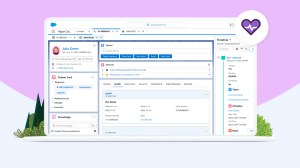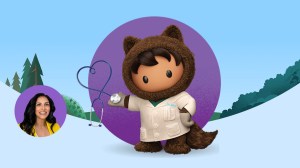Editor’s Note: This article was originally published by CNBC as part of its Pivot Point series.
The world is delivering one of the largest mass vaccination campaigns in human history. While COVID-19 vaccines authorized for emergency use — like those from Pfizer and Moderna — offer the promise of a finish line to this crisis, in the U.S., vaccine distribution is proving to be complicated and multifaceted. It has involved accelerated scientific innovations and now presents new challenges around production, distribution, and community trust.
Despite these challenges, globally we’ve made tremendous leaps and bounds since the start of the pandemic through a variety of public-private partnerships between governments and businesses. Federal organizations, states, and cities have also collaborated closely since the start of the pandemic with tech companies. This has helped to bring new innovations to organizations in the public sector, including modernizing the approach to contact tracing and using tools like chatbots to help deliver important information to citizens.
A lot of good has come out of these partnerships, but there is far more work to be done as we have seen since the start of the country’s vaccination efforts. Technology can be a great accelerator to meet ambitious goals when applied properly.
Digital capabilities that governments need most
Over the course of my career, which included serving as secretary of the Kansas Department of Health and Environment and helping to lead the state’s public health response to the H1N1 pandemic, I’ve seen how the country has lagged behind in investments in public health programs and technology. Technologies that capture immunization information, for example, are so critical as we move forward because they allow public health agencies to monitor the health of communities in real-time and deliver early warnings about outbreaks and illnesses.
Historically, it has been difficult to coordinate healthcare data and experts across multiple public agencies and locations, especially during a disaster, with so many public sector organizations still struggling with outdated, siloed technology. The antiquated approach to this crisis in particular is hard to miss — for example, some organizations are still using the same paper cards for immunization records that have been used for decades. In the context of this pandemic, there has not been sufficient digital infrastructure at the federal or state levels to help quickly analyze disparate, largely unstructured health data or render insights to track and allocate scarce resources.
As vaccinations are being distributed, starting with frontline workers and later to the general public, public sector officials may need the help of a command center at every level — federal, state, and local — that tracks vaccine inventory, the scheduling and administration of doses, and the overall progression to herd immunity.
The public sector must take an honest account of its existing capabilities and identify where the private sector can quickly help modernize its digital infrastructure and facilitate more rapid and efficient vaccinations of citizens. The core technical capabilities that can help cities, states, and the federal government as they begin to vaccinate the general public include:
A digital command center and access to data that drives informed decisions:
Public agencies need solutions that can quickly integrate, analyze, and visualize quality data from multiple sources to inform real-time decision-making. A centralized dashboard could provide cities and states with a 360-degree view of the public health status of their communities, as well as vaccine supply levels and projections of future vaccine needs. A command center can be critical to enabling public sector agility when administering the vaccine — moving supplies to communities and hospitals where there is the greatest need or when inventory is running low.
Digital scheduling and appointment reminders:
Given the scale of the vaccination effort and the fact that two doses of the vaccine are often required for maximum efficacy, governments, and healthcare providers need an efficient way to verify eligibility, obtain consent, and schedule appointments. For example, at Salesforce, we developed technology for creating recall reminders for second doses of vaccines and helping automate appointment scheduling and reminders to provide more timely support to concerned citizens. Automation can help offload basic administrative work, enabling public sector workers to focus on other priorities.
A coordinated and targeted public health campaign:
A recent poll found that 27 percent of American adults were unlikely to get a COVID-19 vaccine. Some groups doubt the severity of the virus, while others — especially those who have historically been wary of, and underserved by, the healthcare system — are concerned about safety. In order to ensure that enough people get vaccinated to sufficiently diminish the virus spread, governments need an effective education and outreach campaign tailored to the concerns of specific communities via various channels, from text notifications to physical mail. Drawing on the power of automation can help them deliver critical and personalized information at scale that can help address potential concerns about the safety of a vaccine.
A critical inflection point
Governments cannot solve these complex problems alone. This pandemic crisis and the next phase of the recovery requires the public sector to build or secure the digital tools they may need to help them effectively manage vaccine campaigns.
Strengthening the public sector’s digital infrastructure will greatly speed up the ability to vaccinate our constituents and community members against COVID-19 and move past this pandemic. Looking further ahead, this will not be the last public health crisis or pandemic. Getting a foundation in place will not only help us face today’s daunting public health challenge but will also help keep us safe and more resilient in the future.
For more information on how Salesforce is supporting one of the largest mass vaccination efforts in history with our vaccine administration management solutions, please visit salesforce.com/vaccines.


















